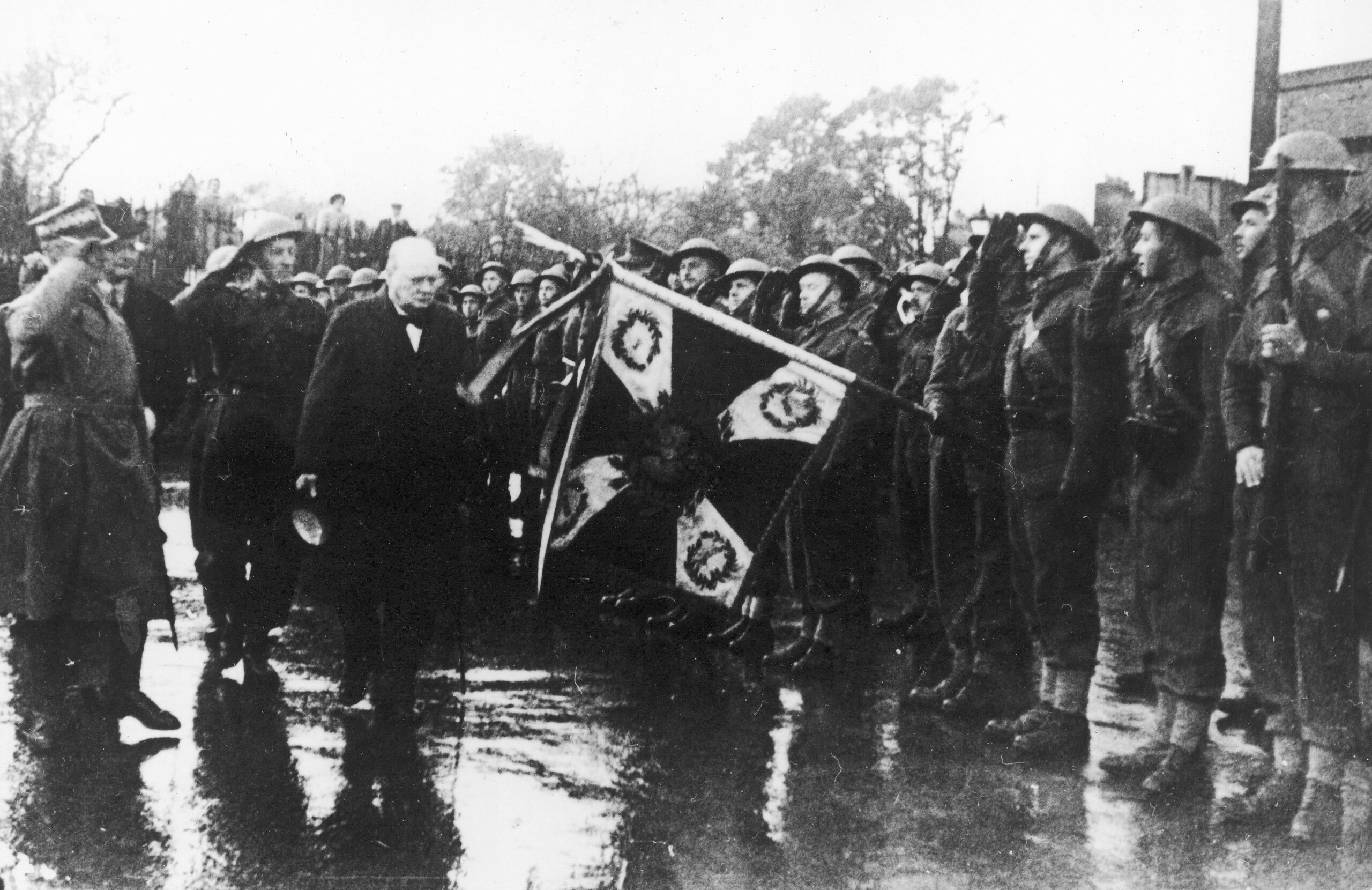During the Second World War, Poland and Britain cooperated closely and shared some joint victories in the air battle for England, Narvik and Monte Cassino. But that’s not all. The contacts among the secret services of both countries were also of significant importance. Lesser known pages from the history of Polish-British cooperation in this period are revealed by Professor Jacek Tebinka, head of the Department of Political Thought and Recent History at the Institute of Political Science at the University of Gdańsk.
Natalia Pochroń, Polish History Museum: When we talk about Polish-British cooperation during the Second World War, the issue of the Polish Armed Forces or the Polish government in exile usually comes to mind. Meanwhile, this cooperation also included diversion and sabotage. When did Poland find itself in the sphere of interest of the British secret services?
Jacek Tebinka: In fact – since Poland was reborn as a state, although it must be admitted that after 1920, when Polish borders had been already set, the interest had dropped significantly. The breakthrough came in March 1939, after Great Britain announced a guarantee of security for Poland. The British feared that the next step for the Germans after the occupation of Bohemia and Moravia would be aggression against Romania, and then also against Poland. The then British Prime Minister Neville Chamberlain created a plan to involve Poland in the diplomatic game, that is to surround the Third Reich and create an “eastern front”, the core of which would be Poland. However, it must be said that this did not mean that Poland would be deliberately drawn into the war, as conservative journalist Stanisław Cat-Mackiewicz claimed and as was later spread by Communist propaganda. On the contrary, the British wanted to prevent it, to “check” Hitler with a potential war on two fronts. It was also from this idea that cooperation among the Polish and British secret services began.
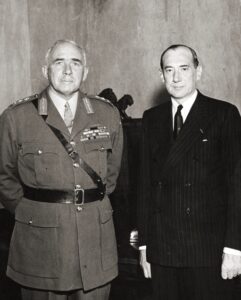
MHP: How did it go?
Jacek Tebinka: Intelligence contacts between the Polish special services, represented by the Second Department of the General Staff of the Polish Army, and the Secret Intelligence Service, (the British civil intelligence), were established before 1939. However, they were not in any way institutionalized at that time, they mainly boiled down to a sporadic exchange of information on the Soviet Union, and to a lesser extent also on the Third Reich. The situation changed in March 1939. Then the cooperation became more active and occurred mainly on two levels.
One of them, relatively unknown, was cooperation in the field of special operations between Second Department and Military Intelligence Research. The Poles and the British exchanged information e.g. on German equipment or sabotage and special operations plans in the event of German aggression. Activities in this area were continued after the defeat of Poland in the September Campaign and brought significant results. It is worth mentioning here, for example, the support that the British provided to the Home Army – whether in the form of money and military equipment, or training for the Cichociemni. On the other hand, the second plane of cooperation is much better known, although initially quite unexpected for the British side, and involved cryptology.
MHP: In the interwar period, the British played a leading role in cryptology, but it was the Poles who managed to break the Enigma code. Why? Under what circumstances did this happen?
Jacek Tebinka: Indeed, in terms of intellectual potential, the British were a leading force in cryptology. However, they focused their efforts mainly on diplomatic ciphers, they were unable to cope with the German military encryption machine. On the other hand, three Poles – Marian Rejewski, Henryk Zygalski and Jerzy Różycki – managed this task. What allowed them to gain an advantage over the British and French and – in short – to break the Enigma, was the reference to the principles of mechanical combinatorics, which had not been used so far in cryptology. Thanks to this, Rejewski was able to discover the theoretical operating principles of the German encryption machine, and then to develop methods for restoring the encryption keys to read the message. As a result, by the end of 1933, Polish cryptologists had developed a method for reading German dispatches, and, by mid-1934, they already had a dozen or so Enigma replicas.
This sounds, from the perspective of several dozen years, an easy success. However, please remember that Germany was constantly introducing changes to its encryption system, which made deciphering methods worthless and required constant work on re-breaking the codes. It was certainly not easy, but all these efforts meant that Poles were the only ones in the world able to read machine-encrypted German dispatches. This success had international significance. Neither British nor French intelligence services were able to do this before 1940.
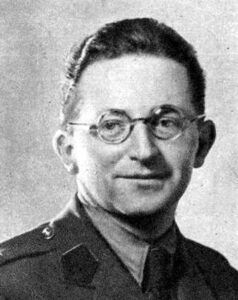
MHP: At some point, the Poles decided to share their discovery with their allies.
Jacek Tebinka: Yes, with time, the breaking of the Enigma became too difficult for the Polish side – mainly financially. When the Polish General Staff realized that there wouldn’t be enough time to make an appropriate number of “bombs” and “sheets” before a possible German attack, a decision was made to share the knowledge about the Enigma with Western allies. It happened at a meeting of representatives of British, French and Polish intelligence, which took place on 25 July 1939 at a conference in Pyry near Warsaw. Although it was a long time before the British authorities decided to prioritize intelligence activities, British cryptologists realized the enormous importance of the information obtained from the Poles. Undoubtedly, it turned out to be very important from the point of view of intelligence role during the Second World War. Unfortunately, cooperation in this area was not able to prevent German aggression and the defeat we suffered in September 1939.
MHP: It is estimated that on the eve of the outbreak of the Second World War, Polish intelligence in 80-90% was aware of the distribution of Wehrmacht units on the Polish-German border. Did this knowledge help in defense against German aggression?
Jacek Tebinka: They knew about it to a large extent, but not completely, because some German units were transferred over the border with Poland at the last moment. Then, suddenly, the date of the German aggression was also changed. According to the original plans, it was to take place on 26 August. As a result of Italy’s refusal to join the war and the conclusion of a Polish-British alliance, the attack was postponed by a week. An additional problem was the Polish concept of defense along the borders, which in the face of the German attack from the air and the high mobility of the German army turned out to be completely ineffective. Thus, a quite good awareness of the German deployment and potential in September 1939 did not help much.
MHP: What was the cryptological cooperation between Poles, French and British like in the following months of the war? It seems that the latter were initially quite skeptical about cooperation with Polish cryptologists.
Jacek Tebinka: Not really. The British were aware of the potential of Polish cryptologists. In the administrative documentation of the Government Code and Cypher School from the Second World War, declassified a few years ago, there was a dispatch addressed to Paris. It turns out that at the end of 1939 and at the beginning of 1940, the British tried to bring Polish experts to Bletchley Park – the seat of British cryptology. The French authorities, of course, did not agree to this. Polish cryptologists were placed in a French center codenamed “Bruno”, where, together with French and Spanish Republican cryptologists, they were breaking ciphers in cooperation with the British. However, it was a challenge to transfer information quickly to the Allied command. The lack of such a “hotline” meant that some of the knowledge obtained by cryptologists was not used by the military in the spring of 1940.
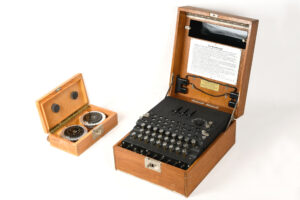
MHP: However, Allies got to know about the situation in occupied Poland.
Jacek Tebinka: Yes, an interesting topic here is the period from the fall of 1940 to the fall of 1942, when a group of Polish cryptologists operated in a secret Cadix facility in the south of France. At that time, Poles read the reports not only of the Wehrmacht, but also the SS and German Police, which were not encrypted with the Enigma. Thanks to this, they obtained a lot of information about the extermination of the population in the territories of occupied Poland and the Soviet Union – the German Einsatzgruppen units systematically reported to Berlin via radio about the number of killed Jews, communists and “bandits.” The information obtained in this way was then transferred to the Allied command in London. Interestingly, the British intelligence also read these reports and had information about the crimes committed in occupied Poland. However, no use was made of them. The British were fighting for survival then, and the news from Poland did not matter much to them. Moreover, the only way to end the genocide was to defeat the Third Reich and its allies.
The activities of Polish cryptologists in France, however, worried London. No wonder: a group of Poles who knew one of the greatest secrets of the war were operating in Vichy France, that is, in the territory under the control of the Third Reich! If Berlin had detected their activities, the consequences would have been catastrophic. Such a risk appeared especially in the fall of 1942, when some Polish cryptologists were arrested by the Germans. Fortunately, however, they did not manage to get information from the Poles that would allow them to find out that the Allies were systematically breaking the Enigma
MHP: Many people today criticize General Władysław Sikorski for not using enough Poles’ successes – both on the intelligence and military levels – and negotiating more for Poland. Is this correct?
Jacek Tebinka: General Sikorski is underestimated today, and his contribution to the cause of the Allies during the Second World War is often undermined or marginalized. It is completely wrong. Although he did not have many victories on the battlefield, he achieved quite a lot in the field of diplomacy. One of his greatest achievements was the largely successful international fight to prevent the approval of the German-Soviet pact and authorization of the partition of Poland. In addition to maintaining diplomatic relations with many countries, Poles managed to open new posts, especially in Latin America. All this was not only symbolic, but also practical in terms of taking care of Polish refugees. The scale of help that Polish diplomacy granted to the people of Jewish origin is impressive. This is one of the most beautiful, but unfortunately unknown, pages of Polish diplomacy from the Second World War, recently remembered in a special publication Polish Diplomatic Documents.
Sikorski’s great success was also in arranging relations with the Soviet Union. In my opinion, he achieved the most he could in summer of 1941. The most contentious issue was Polish Eastern frontier – the Riga border: many accused him of not having forced Moscow to acknowledge it. In my opinion, there was no chance of that. Sikorski’s opponents believed that Russia would be more inclined to negotiate when it suffered military defeats. As it turned out, however, Russia managed to rise up after these defeats and go on a counteroffensive.
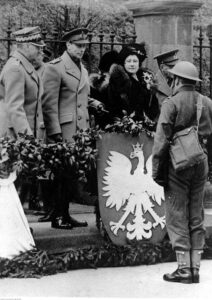
MHP: And the criticism of the Sikorski-Mayski accord? The phrase used in it about the “amnesty for Poland” of prisoners probably arouses the most controversy when it comes to Sikorski’s activities.
Jacek Tebinka: In my opinion, it is also wrong. The British acted as an intermediary in the negotiations of this treaty, and contrary to various myths repeated later, they did not pressure General Sikorski to make a concession in agreeing to use such a phrase. He was ready to agree and, actually, it was the best solution.
Of course, from the legalistic point of view, it raises doubts – according to us, the people imprisoned by the Russians were innocent. But for Sikorski, practical solutions prevailed. The conclusion of this agreement was beneficial, for example, because the Polish embassy gained a legal basis to demand the release of Polish citizens. It should also be noted that the Russians had never released such a large number of prisoners from the Gulag Archipelago before. This was something unheard of before 1953. Stalin made far-reaching concessions due to the military situation and the search for new allies after the attack by the Third Reich.
Thus, Sikorski was guided by pragmatic considerations, which – irrespective of the nomenclature – allowed many Poles to regain freedom. His approach turned out to be less accurate in 1943, after the USSR broke diplomatic relations with the Polish government. Sikorski was convinced that Moscow, despite its military successes, would not play a major role in the liberation of Poland. However, he did not live to see the failure of his calculations – on the night of 4–5 July 1943, he died in a plane crash in Gibraltar.
MHP: This catastrophe and the death of General Władysław Sikorski still raises a lot of ambiguity and even more controversy. What can we say for sure?
Jacek Tebinka: The death of leaders in catastrophes usually gives rise to many different stories and conspiracy theories, often without foundation. The same concerns the death of Polish Prime Minister General Władysław Sikorski. In this case, the source of all conspiracy theories, later only modified, was Joseph Goebbels, Minister of Propaganda in the Third Reich. At his command, Nazi propaganda created a narrative according to which Soviet agents acting on Churchill’s orders were responsible for Sikorski’s death. [Claiming that Churchill] wanted to get rid of the general who was an obstacle to maintaining good British-Soviet relations.
Such a theory, with the limited access to information at the time, could be a source of influence, especially since the technical causes of this tragedy were not really known. To investigate its circumstances, the British appointed a special commission of inquiry, which admittedly concluded that no sabotage had taken place, but at the same time was unable to explain what was the cause of the blocking of the rudders and the plane crash. The unclear circumstances still raise a lot of controversy to this day.
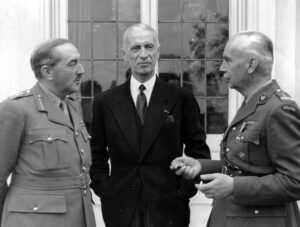
MHP: How do the experience of Polish-British military cooperation influence contemporary relations between these countries?
Jacek Tebinka: These experiences have little impact on contemporary Polish-British relations, due to the fact that the history of Poland is rather little known in Great Britain. On the other hand, Poles maintain many myths that are today additionally fueled by social media, which unfortunately facilitate the reproduction of stereotypes without any critical comment.
One of them claims that the British dragged Poland into the war in order to gain time. Another concerns the death of Sikorski and the belief that the British are hiding documents on this matter. Added to this is the narrative of the betrayal of Poland by Great Britain and the USA in Yalta. This is a far-reaching simplification. Hardly anyone has the time and willingness to learn more about it. Meanwhile, reading the diplomatic documentation from that period shows that the situation was much more complicated and that without the use of armed force, it was practically impossible to postpone the prospect of the Soviet’s domination in Poland. Interestingly, Churchill considered such a move in the spring of 1945. However, it was completely unrealistic, there was no political will then to wage a new war, only to liberate the countries of Central and Eastern Europe from Soviet domination.
Interviewer: Natalia Pochroń
Translation: Alicja Rose & Jessica Sirotin

